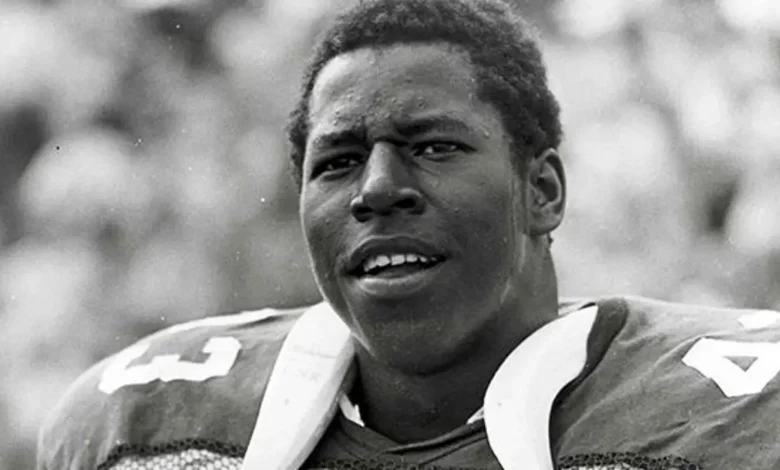Auburn’s James Owens and overshadowed history as state of Alabama’s first Black player

In the heart of the deep South, where football is woven into the very fabric of local culture, the name James Owens should be synonymous with breaking barriers, history, and the courage it takes to step into the unknown. Owens made history as the first Black player to compete for the University of Alabama’s Auburn Tigers football team, an achievement that occurred at a time when segregation was still deeply entrenched in the American South. Despite his monumental role in shaping the history of college football in the state of Alabama, Owens’ story has often been overshadowed by other narratives, and his contributions remain underappreciated by many.
James Owens’ path to becoming a pioneer for Black athletes in Alabama is a story about struggle, resilience, and the quiet courage required to take on an institution steeped in racial division. In the early 1970s, when Owens arrived at Auburn, the world of college sports — particularly football — was still largely segregated, with Black athletes being few and far between in certain parts of the country. Owens did not just break through the racial divide; he became a symbol of the progress that was slowly, but steadily, being made.
However, his story is often relegated to the sidelines, overshadowed by the larger narratives of other African American trailblazers, like Jackie Robinson in baseball or even other players who became famous in college football at the time. For many years, Owens lived in the shadow of the athletes who followed in his footsteps, his name often lost in the annals of history. But now, as society continues to reflect on the untold histories of Black athletes, Owens’ legacy deserves recognition as one of the most courageous and impactful figures in the history of Alabama football.
The Alabama of the 1970s was a state still grappling with the vestiges of the Jim Crow laws. Racial segregation was alive and well, and the struggle for civil rights was ongoing. In such an environment, sports became more than just games — they were battlegrounds for equality, social change, and acceptance. Football, particularly, was woven into the culture of the state. It was an institution that defined communities, schools, and families. While college football had begun integrating in other parts of the country, Alabama lagged behind, entrenched in a deeply segregated mindset.
Throughout much of the 1960s and early 1970s, schools like Auburn and Alabama were reluctant to allow Black players to compete, reflecting the larger racial tensions in the South. The few Black athletes who had made it into SEC schools in the early 1960s had faced immense obstacles, both on and off the field. Racial tensions simmered beneath the surface of southern college sports, and many athletes, coaches, and fans were not yet ready to accept integration in such a deeply embedded tradition.
In this environment, James Owens was a pioneering figure — not only in terms of football but also in the broader societal context. Owens’ decision to join Auburn was, in many ways, a political statement, one that made waves at the time but would go largely unrecognized in the following decades.
James Owens was born in Opelika, Alabama, just a few miles down the road from Auburn University. Growing up in the segregated South, Owens, like many Black athletes of his time, had limited opportunities to pursue his passion for football. Despite the racial barriers in place, he was determined to play the game he loved.
His journey to Auburn University began in the late 1960s, when he was recruited by the Tigers’ football program. The team, then led by Coach Ralph “Shug” Jordan, had been cautious in its approach to integration. Auburn had not yet signed a Black player to the roster, and the prospect of adding one was seen as controversial by some. The atmosphere was charged with resistance, and it was not an easy decision for anyone involved. But Owens, undeterred by the challenges ahead, made his commitment to Auburn and arrived on campus as the first Black football player in the state of Alabama to join a major university’s football program.
Owens’ first few seasons at Auburn were filled with challenges. He faced not only physical obstacles but emotional and psychological hurdles. As a Black man on a team where most of his teammates were white, Owens was forced to navigate a world of unspoken biases, subtle (and sometimes overt) racism, and a culture that made him feel like an outsider in the very place where he was supposed to belong. The pressure to perform at a high level while carrying the weight of being a trailblazer was enormous. Despite these difficulties, Owens excelled on the field.
In his first season with the Tigers, Owens became an integral part of the team. His physicality, speed, and understanding of the game allowed him to rise quickly through the ranks. While his individual performance was outstanding, it was his ability to unite a team that had been so divided that made his role so historically significant. He was not just a player on the field; he was a bridge — a link between an increasingly divided world and the changing landscape of college athletics.
Despite his athletic prowess, Owens faced relentless challenges off the field. Auburn fans, in particular, were not universally welcoming to the notion of a Black player on their beloved football team. As the first African American to play for the Tigers, Owens became the subject of scrutiny from both fans and members of the community who were unprepared for the integration of college football in Alabama.
Owens’ presence at Auburn came with a complex mixture of support and backlash. On the one hand, some fans and players embraced him, understanding that his inclusion was an essential step forward for both the team and the state. On the other hand, many fans were openly hostile. Some refused to acknowledge him, while others made their displeasure known through racial slurs or other forms of discrimination. For Owens, the emotional toll was often overwhelming, and he frequently found solace only in the locker room and on the field.
However, despite the adversity, Owens remained steadfast and dedicated to the team. His work ethic and determination were undeniable, and he played a critical role in Auburn’s defensive line. His influence was also profound for future Black athletes, who saw in Owens not just a talented football player but someone who had made a difference through sheer grit and perseverance.
James Owens’ place in history, however, has often been overshadowed. In many ways, Owens’ story has been relegated to the background of Auburn’s football history, and his contributions have not been adequately recognized on a broader scale. This is not uncommon for African American athletes who were among the first to integrate predominantly white teams or schools; their achievements are often overlooked or minimized as society moves on to focus on the next story of racial progress. Owens’ time at Auburn, while significant, has been largely overshadowed by the stories of other players who came after him, players who found their place in an increasingly integrated college football world.
It wasn’t until much later that Owens received the recognition he deserved for his role in breaking racial barriers at Auburn. Despite his impressive career, Owens was not widely celebrated, and the history of his pioneering efforts often goes unnoticed in mainstream narratives of college football’s integration. His status as the first Black player in the state of Alabama’s college football history is not as widely known as it should be, and his groundbreaking contributions to the game remain underappreciated.
James Owens’ story is not just about the integration of football in Alabama. His legacy speaks to the broader struggle for equality and recognition of Black athletes across the nation. Owens was not only breaking racial barriers at Auburn — he was also a part of the larger movement that sought to challenge societal norms and push for systemic change.
Auburn’s football program, which went on to become a powerhouse in college football, owes much of its success to the athletes who came before the more widely known stars of the 1980s and 1990s. Owens was a trailblazer who opened the door for future Black players, laying the foundation for the diversity that would define college football in years to come. His courage to step onto the field, knowing the obstacles that awaited him, set a precedent for future generations of athletes who would follow in his footsteps.
It’s essential that we remember and honor players like Owens who paved the way for others. Without his sacrifice and perseverance, the landscape of college football — and particularly SEC football — may have looked very different. His story is one of courage, resilience, and determination, and his contributions to the history of Auburn and Alabama football deserve more recognition.
James Owens may not have received the recognition he deserved during his playing days, but his legacy as the first Black player for Auburn University and his role in the integration of college football in Alabama should never be forgotten. His story is a testament to the power of perseverance, courage, and the quiet strength it takes to break down barriers that others thought were insurmountable.
As the world continues to reflect on the contributions of Black athletes to the world of sports, Owens’ story deserves a more prominent place in the history books. His courage to be the first — and to face the challenges that came with it — made him a true pioneer, and his role in shaping Auburn’s football program, as well as the state of Alabama’s sports culture, cannot be overstated. For James Owens, the struggle for recognition and respect was part of a larger fight for equality — a fight that ultimately helped change the course of college football history forever.









